Introduction to Business Operations and Management
VerifiedAdded on 2023/01/17
|9
|2800
|33
AI Summary
This report provides an introduction to business operations and management, focusing on the main functions of business operations and an overview of Unilever. It also evaluates the operations management decisions of the company in areas such as production, supply chain, logistics, location strategies, quality control, and human resource.
Contribute Materials
Your contribution can guide someone’s learning journey. Share your
documents today.
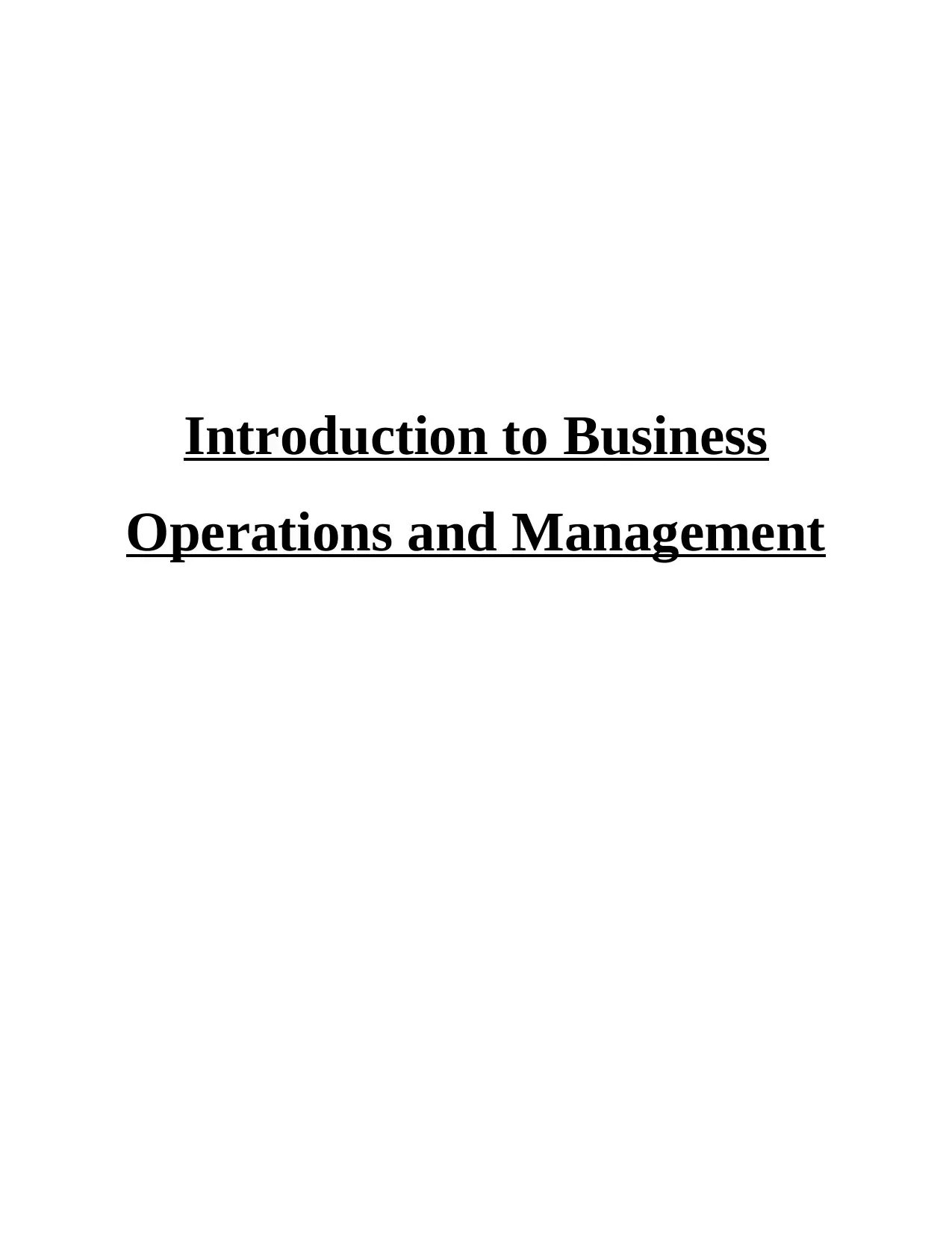
Introduction to Business
Operations and Management
Operations and Management
Secure Best Marks with AI Grader
Need help grading? Try our AI Grader for instant feedback on your assignments.
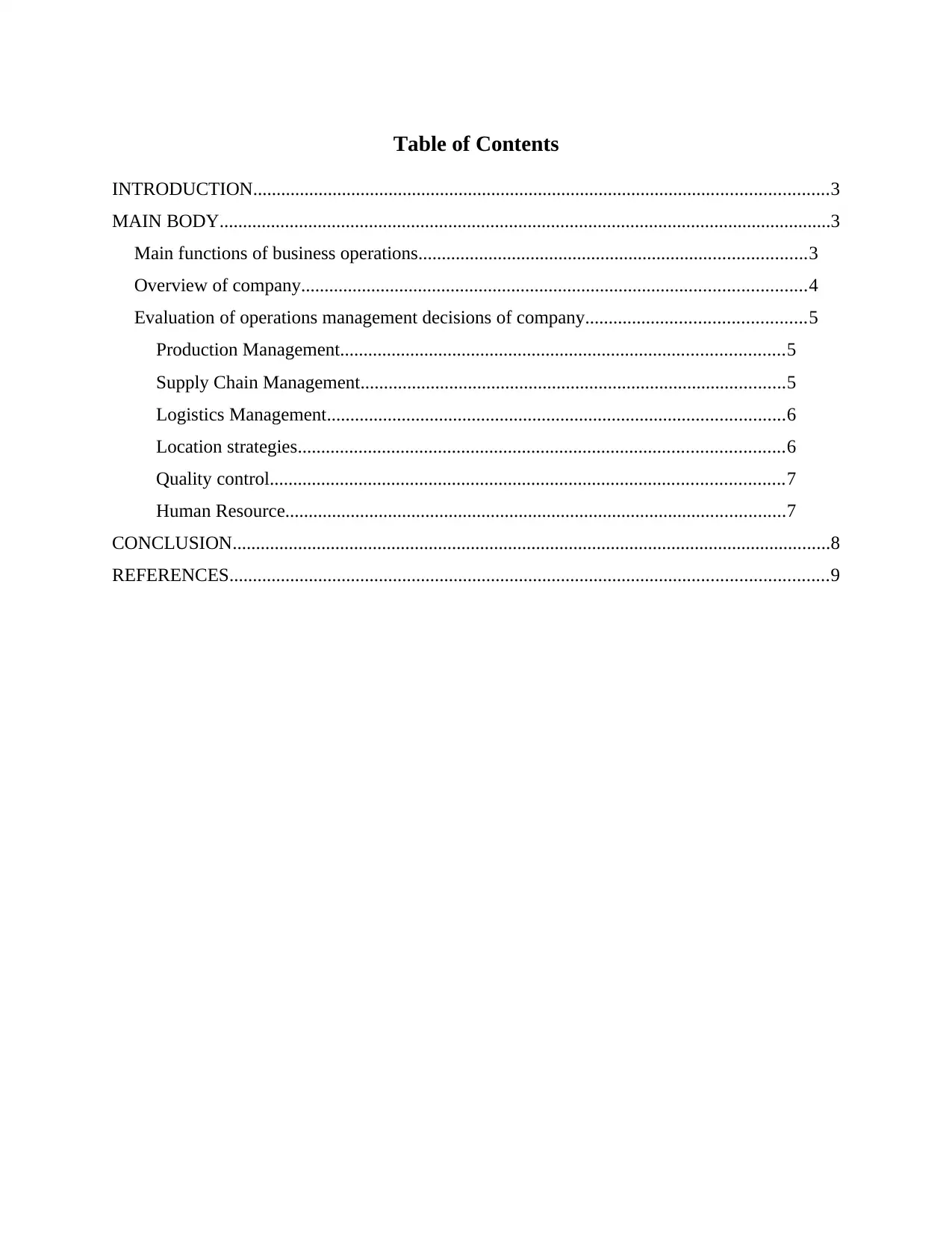
Table of Contents
INTRODUCTION...........................................................................................................................3
MAIN BODY...................................................................................................................................3
Main functions of business operations...................................................................................3
Overview of company............................................................................................................4
Evaluation of operations management decisions of company...............................................5
Production Management...............................................................................................5
Supply Chain Management...........................................................................................5
Logistics Management..................................................................................................6
Location strategies........................................................................................................6
Quality control..............................................................................................................7
Human Resource...........................................................................................................7
CONCLUSION................................................................................................................................8
REFERENCES................................................................................................................................9
INTRODUCTION...........................................................................................................................3
MAIN BODY...................................................................................................................................3
Main functions of business operations...................................................................................3
Overview of company............................................................................................................4
Evaluation of operations management decisions of company...............................................5
Production Management...............................................................................................5
Supply Chain Management...........................................................................................5
Logistics Management..................................................................................................6
Location strategies........................................................................................................6
Quality control..............................................................................................................7
Human Resource...........................................................................................................7
CONCLUSION................................................................................................................................8
REFERENCES................................................................................................................................9
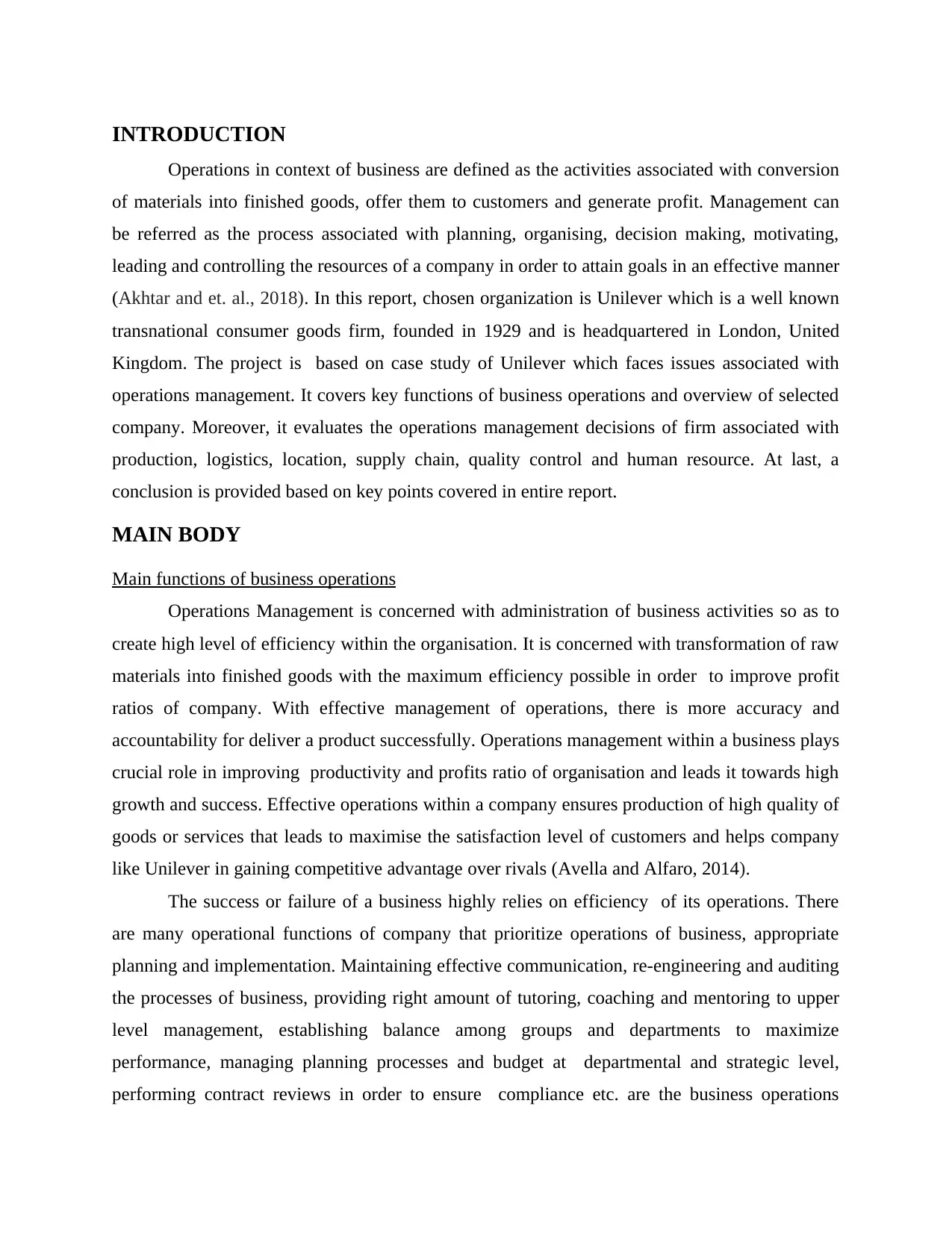
INTRODUCTION
Operations in context of business are defined as the activities associated with conversion
of materials into finished goods, offer them to customers and generate profit. Management can
be referred as the process associated with planning, organising, decision making, motivating,
leading and controlling the resources of a company in order to attain goals in an effective manner
(Akhtar and et. al., 2018). In this report, chosen organization is Unilever which is a well known
transnational consumer goods firm, founded in 1929 and is headquartered in London, United
Kingdom. The project is based on case study of Unilever which faces issues associated with
operations management. It covers key functions of business operations and overview of selected
company. Moreover, it evaluates the operations management decisions of firm associated with
production, logistics, location, supply chain, quality control and human resource. At last, a
conclusion is provided based on key points covered in entire report.
MAIN BODY
Main functions of business operations
Operations Management is concerned with administration of business activities so as to
create high level of efficiency within the organisation. It is concerned with transformation of raw
materials into finished goods with the maximum efficiency possible in order to improve profit
ratios of company. With effective management of operations, there is more accuracy and
accountability for deliver a product successfully. Operations management within a business plays
crucial role in improving productivity and profits ratio of organisation and leads it towards high
growth and success. Effective operations within a company ensures production of high quality of
goods or services that leads to maximise the satisfaction level of customers and helps company
like Unilever in gaining competitive advantage over rivals (Avella and Alfaro, 2014).
The success or failure of a business highly relies on efficiency of its operations. There
are many operational functions of company that prioritize operations of business, appropriate
planning and implementation. Maintaining effective communication, re-engineering and auditing
the processes of business, providing right amount of tutoring, coaching and mentoring to upper
level management, establishing balance among groups and departments to maximize
performance, managing planning processes and budget at departmental and strategic level,
performing contract reviews in order to ensure compliance etc. are the business operations
Operations in context of business are defined as the activities associated with conversion
of materials into finished goods, offer them to customers and generate profit. Management can
be referred as the process associated with planning, organising, decision making, motivating,
leading and controlling the resources of a company in order to attain goals in an effective manner
(Akhtar and et. al., 2018). In this report, chosen organization is Unilever which is a well known
transnational consumer goods firm, founded in 1929 and is headquartered in London, United
Kingdom. The project is based on case study of Unilever which faces issues associated with
operations management. It covers key functions of business operations and overview of selected
company. Moreover, it evaluates the operations management decisions of firm associated with
production, logistics, location, supply chain, quality control and human resource. At last, a
conclusion is provided based on key points covered in entire report.
MAIN BODY
Main functions of business operations
Operations Management is concerned with administration of business activities so as to
create high level of efficiency within the organisation. It is concerned with transformation of raw
materials into finished goods with the maximum efficiency possible in order to improve profit
ratios of company. With effective management of operations, there is more accuracy and
accountability for deliver a product successfully. Operations management within a business plays
crucial role in improving productivity and profits ratio of organisation and leads it towards high
growth and success. Effective operations within a company ensures production of high quality of
goods or services that leads to maximise the satisfaction level of customers and helps company
like Unilever in gaining competitive advantage over rivals (Avella and Alfaro, 2014).
The success or failure of a business highly relies on efficiency of its operations. There
are many operational functions of company that prioritize operations of business, appropriate
planning and implementation. Maintaining effective communication, re-engineering and auditing
the processes of business, providing right amount of tutoring, coaching and mentoring to upper
level management, establishing balance among groups and departments to maximize
performance, managing planning processes and budget at departmental and strategic level,
performing contract reviews in order to ensure compliance etc. are the business operations
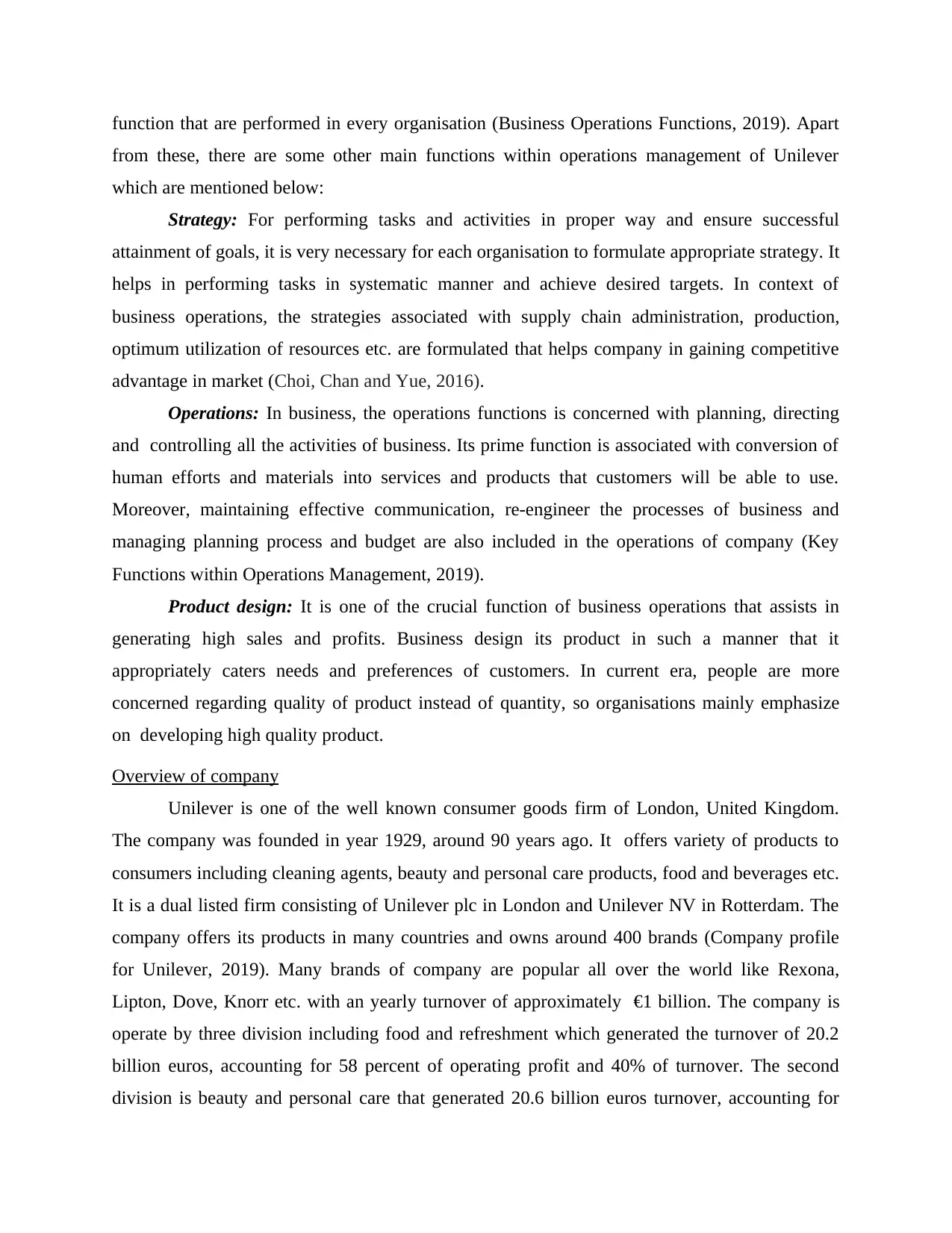
function that are performed in every organisation (Business Operations Functions, 2019). Apart
from these, there are some other main functions within operations management of Unilever
which are mentioned below:
Strategy: For performing tasks and activities in proper way and ensure successful
attainment of goals, it is very necessary for each organisation to formulate appropriate strategy. It
helps in performing tasks in systematic manner and achieve desired targets. In context of
business operations, the strategies associated with supply chain administration, production,
optimum utilization of resources etc. are formulated that helps company in gaining competitive
advantage in market (Choi, Chan and Yue, 2016).
Operations: In business, the operations functions is concerned with planning, directing
and controlling all the activities of business. Its prime function is associated with conversion of
human efforts and materials into services and products that customers will be able to use.
Moreover, maintaining effective communication, re-engineer the processes of business and
managing planning process and budget are also included in the operations of company (Key
Functions within Operations Management, 2019).
Product design: It is one of the crucial function of business operations that assists in
generating high sales and profits. Business design its product in such a manner that it
appropriately caters needs and preferences of customers. In current era, people are more
concerned regarding quality of product instead of quantity, so organisations mainly emphasize
on developing high quality product.
Overview of company
Unilever is one of the well known consumer goods firm of London, United Kingdom.
The company was founded in year 1929, around 90 years ago. It offers variety of products to
consumers including cleaning agents, beauty and personal care products, food and beverages etc.
It is a dual listed firm consisting of Unilever plc in London and Unilever NV in Rotterdam. The
company offers its products in many countries and owns around 400 brands (Company profile
for Unilever, 2019). Many brands of company are popular all over the world like Rexona,
Lipton, Dove, Knorr etc. with an yearly turnover of approximately €1 billion. The company is
operate by three division including food and refreshment which generated the turnover of 20.2
billion euros, accounting for 58 percent of operating profit and 40% of turnover. The second
division is beauty and personal care that generated 20.6 billion euros turnover, accounting for
from these, there are some other main functions within operations management of Unilever
which are mentioned below:
Strategy: For performing tasks and activities in proper way and ensure successful
attainment of goals, it is very necessary for each organisation to formulate appropriate strategy. It
helps in performing tasks in systematic manner and achieve desired targets. In context of
business operations, the strategies associated with supply chain administration, production,
optimum utilization of resources etc. are formulated that helps company in gaining competitive
advantage in market (Choi, Chan and Yue, 2016).
Operations: In business, the operations functions is concerned with planning, directing
and controlling all the activities of business. Its prime function is associated with conversion of
human efforts and materials into services and products that customers will be able to use.
Moreover, maintaining effective communication, re-engineer the processes of business and
managing planning process and budget are also included in the operations of company (Key
Functions within Operations Management, 2019).
Product design: It is one of the crucial function of business operations that assists in
generating high sales and profits. Business design its product in such a manner that it
appropriately caters needs and preferences of customers. In current era, people are more
concerned regarding quality of product instead of quantity, so organisations mainly emphasize
on developing high quality product.
Overview of company
Unilever is one of the well known consumer goods firm of London, United Kingdom.
The company was founded in year 1929, around 90 years ago. It offers variety of products to
consumers including cleaning agents, beauty and personal care products, food and beverages etc.
It is a dual listed firm consisting of Unilever plc in London and Unilever NV in Rotterdam. The
company offers its products in many countries and owns around 400 brands (Company profile
for Unilever, 2019). Many brands of company are popular all over the world like Rexona,
Lipton, Dove, Knorr etc. with an yearly turnover of approximately €1 billion. The company is
operate by three division including food and refreshment which generated the turnover of 20.2
billion euros, accounting for 58 percent of operating profit and 40% of turnover. The second
division is beauty and personal care that generated 20.6 billion euros turnover, accounting for
Secure Best Marks with AI Grader
Need help grading? Try our AI Grader for instant feedback on your assignments.
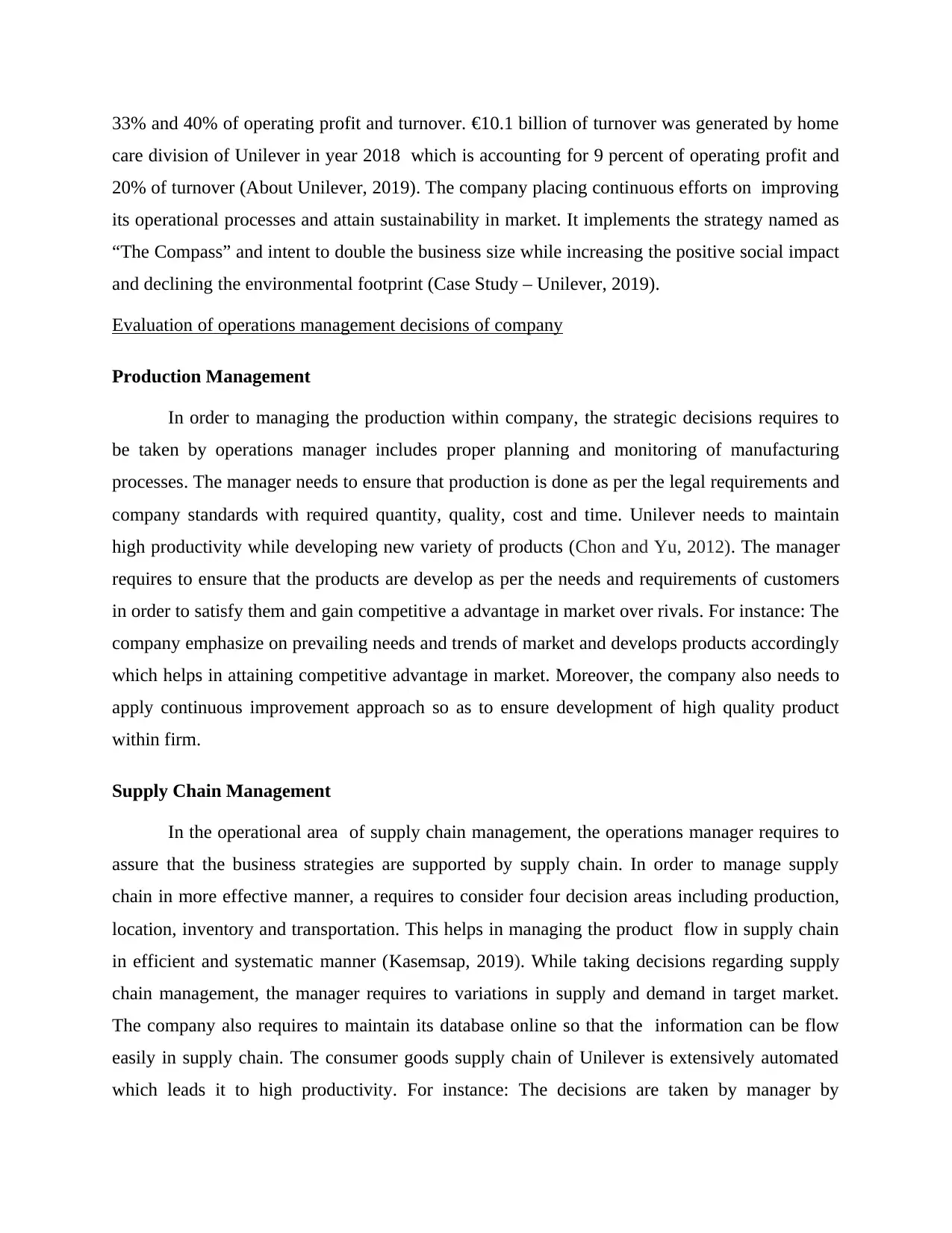
33% and 40% of operating profit and turnover. €10.1 billion of turnover was generated by home
care division of Unilever in year 2018 which is accounting for 9 percent of operating profit and
20% of turnover (About Unilever, 2019). The company placing continuous efforts on improving
its operational processes and attain sustainability in market. It implements the strategy named as
“The Compass” and intent to double the business size while increasing the positive social impact
and declining the environmental footprint (Case Study – Unilever, 2019).
Evaluation of operations management decisions of company
Production Management
In order to managing the production within company, the strategic decisions requires to
be taken by operations manager includes proper planning and monitoring of manufacturing
processes. The manager needs to ensure that production is done as per the legal requirements and
company standards with required quantity, quality, cost and time. Unilever needs to maintain
high productivity while developing new variety of products (Chon and Yu, 2012). The manager
requires to ensure that the products are develop as per the needs and requirements of customers
in order to satisfy them and gain competitive a advantage in market over rivals. For instance: The
company emphasize on prevailing needs and trends of market and develops products accordingly
which helps in attaining competitive advantage in market. Moreover, the company also needs to
apply continuous improvement approach so as to ensure development of high quality product
within firm.
Supply Chain Management
In the operational area of supply chain management, the operations manager requires to
assure that the business strategies are supported by supply chain. In order to manage supply
chain in more effective manner, a requires to consider four decision areas including production,
location, inventory and transportation. This helps in managing the product flow in supply chain
in efficient and systematic manner (Kasemsap, 2019). While taking decisions regarding supply
chain management, the manager requires to variations in supply and demand in target market.
The company also requires to maintain its database online so that the information can be flow
easily in supply chain. The consumer goods supply chain of Unilever is extensively automated
which leads it to high productivity. For instance: The decisions are taken by manager by
care division of Unilever in year 2018 which is accounting for 9 percent of operating profit and
20% of turnover (About Unilever, 2019). The company placing continuous efforts on improving
its operational processes and attain sustainability in market. It implements the strategy named as
“The Compass” and intent to double the business size while increasing the positive social impact
and declining the environmental footprint (Case Study – Unilever, 2019).
Evaluation of operations management decisions of company
Production Management
In order to managing the production within company, the strategic decisions requires to
be taken by operations manager includes proper planning and monitoring of manufacturing
processes. The manager needs to ensure that production is done as per the legal requirements and
company standards with required quantity, quality, cost and time. Unilever needs to maintain
high productivity while developing new variety of products (Chon and Yu, 2012). The manager
requires to ensure that the products are develop as per the needs and requirements of customers
in order to satisfy them and gain competitive a advantage in market over rivals. For instance: The
company emphasize on prevailing needs and trends of market and develops products accordingly
which helps in attaining competitive advantage in market. Moreover, the company also needs to
apply continuous improvement approach so as to ensure development of high quality product
within firm.
Supply Chain Management
In the operational area of supply chain management, the operations manager requires to
assure that the business strategies are supported by supply chain. In order to manage supply
chain in more effective manner, a requires to consider four decision areas including production,
location, inventory and transportation. This helps in managing the product flow in supply chain
in efficient and systematic manner (Kasemsap, 2019). While taking decisions regarding supply
chain management, the manager requires to variations in supply and demand in target market.
The company also requires to maintain its database online so that the information can be flow
easily in supply chain. The consumer goods supply chain of Unilever is extensively automated
which leads it to high productivity. For instance: The decisions are taken by manager by
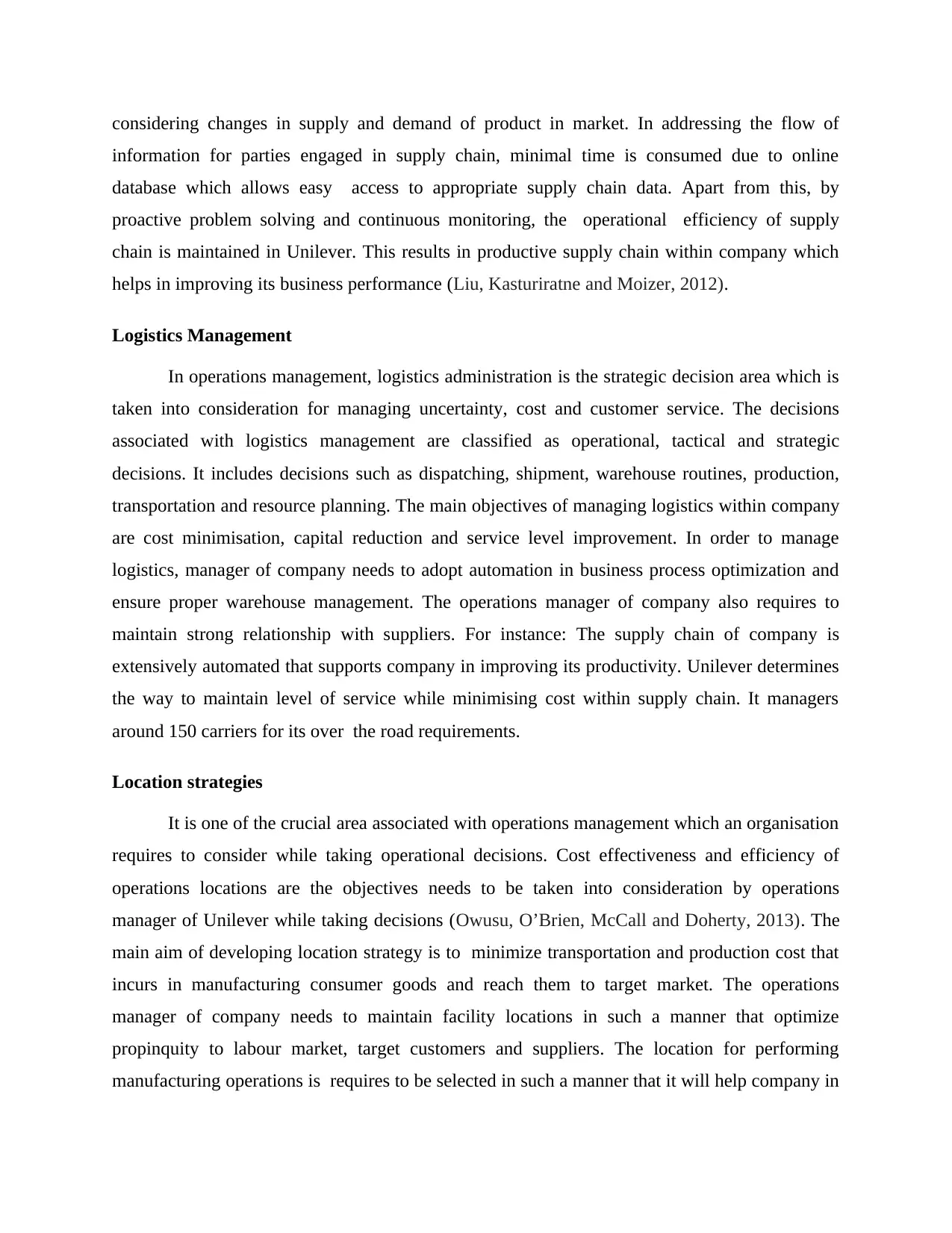
considering changes in supply and demand of product in market. In addressing the flow of
information for parties engaged in supply chain, minimal time is consumed due to online
database which allows easy access to appropriate supply chain data. Apart from this, by
proactive problem solving and continuous monitoring, the operational efficiency of supply
chain is maintained in Unilever. This results in productive supply chain within company which
helps in improving its business performance (Liu, Kasturiratne and Moizer, 2012).
Logistics Management
In operations management, logistics administration is the strategic decision area which is
taken into consideration for managing uncertainty, cost and customer service. The decisions
associated with logistics management are classified as operational, tactical and strategic
decisions. It includes decisions such as dispatching, shipment, warehouse routines, production,
transportation and resource planning. The main objectives of managing logistics within company
are cost minimisation, capital reduction and service level improvement. In order to manage
logistics, manager of company needs to adopt automation in business process optimization and
ensure proper warehouse management. The operations manager of company also requires to
maintain strong relationship with suppliers. For instance: The supply chain of company is
extensively automated that supports company in improving its productivity. Unilever determines
the way to maintain level of service while minimising cost within supply chain. It managers
around 150 carriers for its over the road requirements.
Location strategies
It is one of the crucial area associated with operations management which an organisation
requires to consider while taking operational decisions. Cost effectiveness and efficiency of
operations locations are the objectives needs to be taken into consideration by operations
manager of Unilever while taking decisions (Owusu, O’Brien, McCall and Doherty, 2013). The
main aim of developing location strategy is to minimize transportation and production cost that
incurs in manufacturing consumer goods and reach them to target market. The operations
manager of company needs to maintain facility locations in such a manner that optimize
propinquity to labour market, target customers and suppliers. The location for performing
manufacturing operations is requires to be selected in such a manner that it will help company in
information for parties engaged in supply chain, minimal time is consumed due to online
database which allows easy access to appropriate supply chain data. Apart from this, by
proactive problem solving and continuous monitoring, the operational efficiency of supply
chain is maintained in Unilever. This results in productive supply chain within company which
helps in improving its business performance (Liu, Kasturiratne and Moizer, 2012).
Logistics Management
In operations management, logistics administration is the strategic decision area which is
taken into consideration for managing uncertainty, cost and customer service. The decisions
associated with logistics management are classified as operational, tactical and strategic
decisions. It includes decisions such as dispatching, shipment, warehouse routines, production,
transportation and resource planning. The main objectives of managing logistics within company
are cost minimisation, capital reduction and service level improvement. In order to manage
logistics, manager of company needs to adopt automation in business process optimization and
ensure proper warehouse management. The operations manager of company also requires to
maintain strong relationship with suppliers. For instance: The supply chain of company is
extensively automated that supports company in improving its productivity. Unilever determines
the way to maintain level of service while minimising cost within supply chain. It managers
around 150 carriers for its over the road requirements.
Location strategies
It is one of the crucial area associated with operations management which an organisation
requires to consider while taking operational decisions. Cost effectiveness and efficiency of
operations locations are the objectives needs to be taken into consideration by operations
manager of Unilever while taking decisions (Owusu, O’Brien, McCall and Doherty, 2013). The
main aim of developing location strategy is to minimize transportation and production cost that
incurs in manufacturing consumer goods and reach them to target market. The operations
manager of company needs to maintain facility locations in such a manner that optimize
propinquity to labour market, target customers and suppliers. The location for performing
manufacturing operations is requires to be selected in such a manner that it will help company in
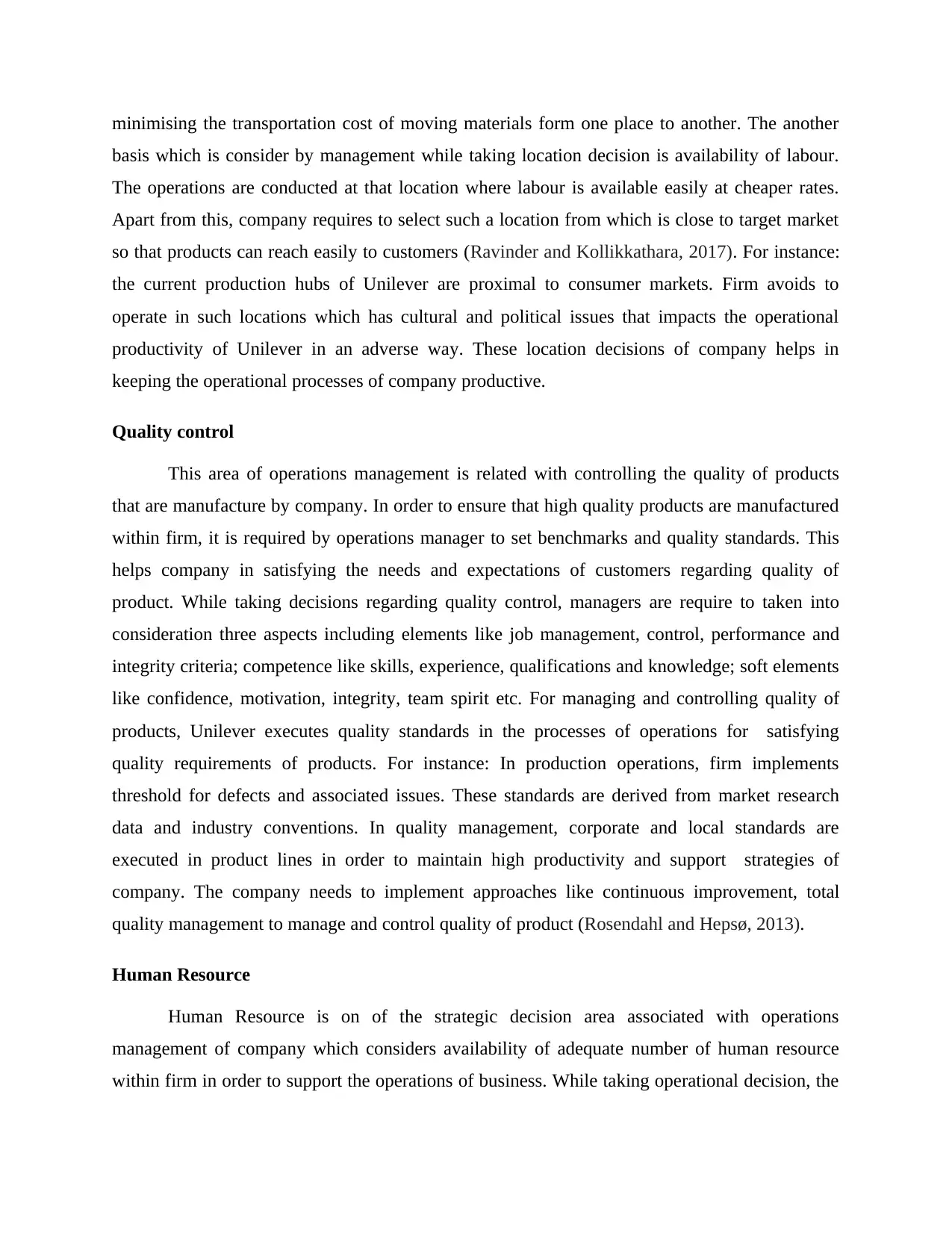
minimising the transportation cost of moving materials form one place to another. The another
basis which is consider by management while taking location decision is availability of labour.
The operations are conducted at that location where labour is available easily at cheaper rates.
Apart from this, company requires to select such a location from which is close to target market
so that products can reach easily to customers (Ravinder and Kollikkathara, 2017). For instance:
the current production hubs of Unilever are proximal to consumer markets. Firm avoids to
operate in such locations which has cultural and political issues that impacts the operational
productivity of Unilever in an adverse way. These location decisions of company helps in
keeping the operational processes of company productive.
Quality control
This area of operations management is related with controlling the quality of products
that are manufacture by company. In order to ensure that high quality products are manufactured
within firm, it is required by operations manager to set benchmarks and quality standards. This
helps company in satisfying the needs and expectations of customers regarding quality of
product. While taking decisions regarding quality control, managers are require to taken into
consideration three aspects including elements like job management, control, performance and
integrity criteria; competence like skills, experience, qualifications and knowledge; soft elements
like confidence, motivation, integrity, team spirit etc. For managing and controlling quality of
products, Unilever executes quality standards in the processes of operations for satisfying
quality requirements of products. For instance: In production operations, firm implements
threshold for defects and associated issues. These standards are derived from market research
data and industry conventions. In quality management, corporate and local standards are
executed in product lines in order to maintain high productivity and support strategies of
company. The company needs to implement approaches like continuous improvement, total
quality management to manage and control quality of product (Rosendahl and Hepsø, 2013).
Human Resource
Human Resource is on of the strategic decision area associated with operations
management of company which considers availability of adequate number of human resource
within firm in order to support the operations of business. While taking operational decision, the
basis which is consider by management while taking location decision is availability of labour.
The operations are conducted at that location where labour is available easily at cheaper rates.
Apart from this, company requires to select such a location from which is close to target market
so that products can reach easily to customers (Ravinder and Kollikkathara, 2017). For instance:
the current production hubs of Unilever are proximal to consumer markets. Firm avoids to
operate in such locations which has cultural and political issues that impacts the operational
productivity of Unilever in an adverse way. These location decisions of company helps in
keeping the operational processes of company productive.
Quality control
This area of operations management is related with controlling the quality of products
that are manufacture by company. In order to ensure that high quality products are manufactured
within firm, it is required by operations manager to set benchmarks and quality standards. This
helps company in satisfying the needs and expectations of customers regarding quality of
product. While taking decisions regarding quality control, managers are require to taken into
consideration three aspects including elements like job management, control, performance and
integrity criteria; competence like skills, experience, qualifications and knowledge; soft elements
like confidence, motivation, integrity, team spirit etc. For managing and controlling quality of
products, Unilever executes quality standards in the processes of operations for satisfying
quality requirements of products. For instance: In production operations, firm implements
threshold for defects and associated issues. These standards are derived from market research
data and industry conventions. In quality management, corporate and local standards are
executed in product lines in order to maintain high productivity and support strategies of
company. The company needs to implement approaches like continuous improvement, total
quality management to manage and control quality of product (Rosendahl and Hepsø, 2013).
Human Resource
Human Resource is on of the strategic decision area associated with operations
management of company which considers availability of adequate number of human resource
within firm in order to support the operations of business. While taking operational decision, the
Paraphrase This Document
Need a fresh take? Get an instant paraphrase of this document with our AI Paraphraser
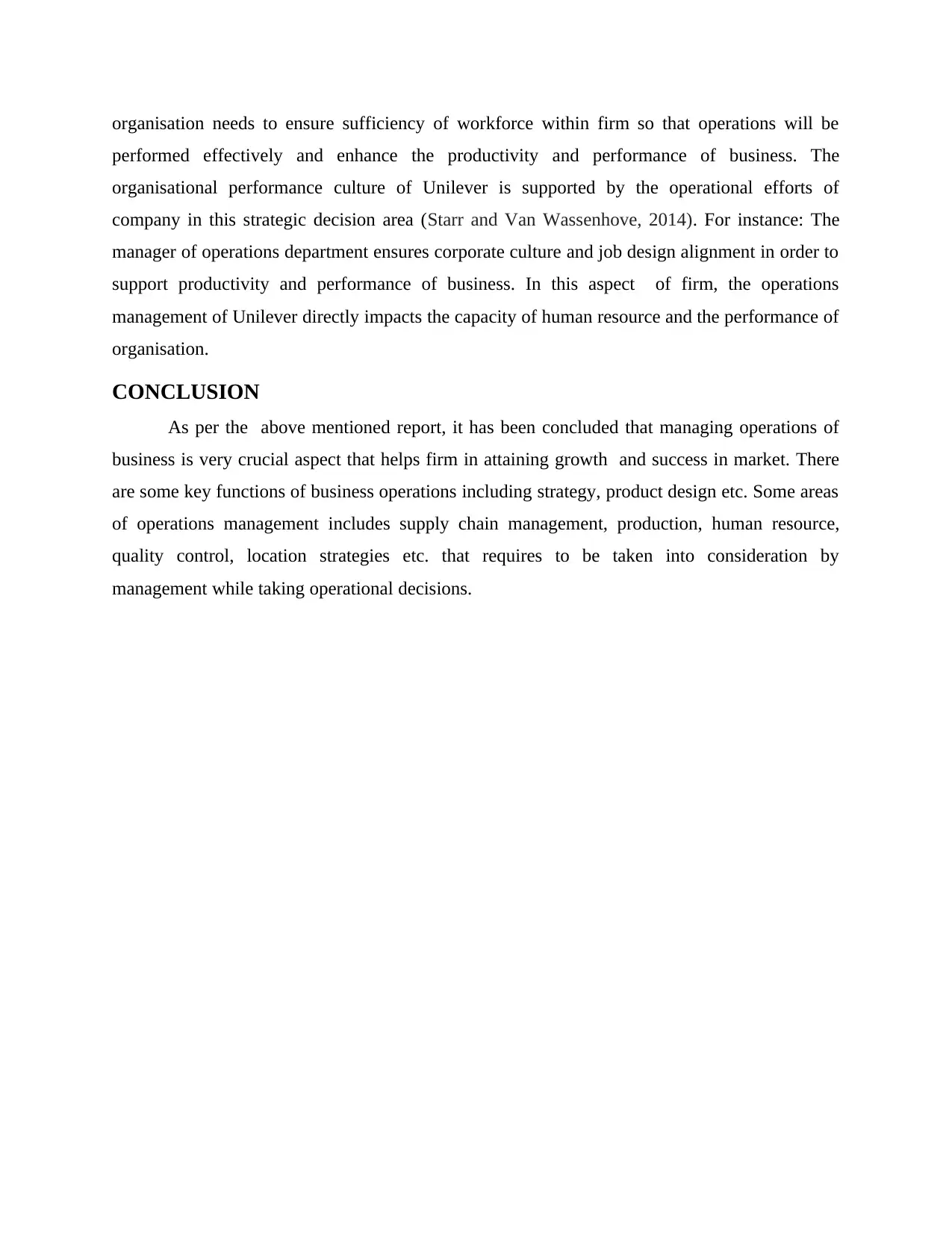
organisation needs to ensure sufficiency of workforce within firm so that operations will be
performed effectively and enhance the productivity and performance of business. The
organisational performance culture of Unilever is supported by the operational efforts of
company in this strategic decision area (Starr and Van Wassenhove, 2014). For instance: The
manager of operations department ensures corporate culture and job design alignment in order to
support productivity and performance of business. In this aspect of firm, the operations
management of Unilever directly impacts the capacity of human resource and the performance of
organisation.
CONCLUSION
As per the above mentioned report, it has been concluded that managing operations of
business is very crucial aspect that helps firm in attaining growth and success in market. There
are some key functions of business operations including strategy, product design etc. Some areas
of operations management includes supply chain management, production, human resource,
quality control, location strategies etc. that requires to be taken into consideration by
management while taking operational decisions.
performed effectively and enhance the productivity and performance of business. The
organisational performance culture of Unilever is supported by the operational efforts of
company in this strategic decision area (Starr and Van Wassenhove, 2014). For instance: The
manager of operations department ensures corporate culture and job design alignment in order to
support productivity and performance of business. In this aspect of firm, the operations
management of Unilever directly impacts the capacity of human resource and the performance of
organisation.
CONCLUSION
As per the above mentioned report, it has been concluded that managing operations of
business is very crucial aspect that helps firm in attaining growth and success in market. There
are some key functions of business operations including strategy, product design etc. Some areas
of operations management includes supply chain management, production, human resource,
quality control, location strategies etc. that requires to be taken into consideration by
management while taking operational decisions.
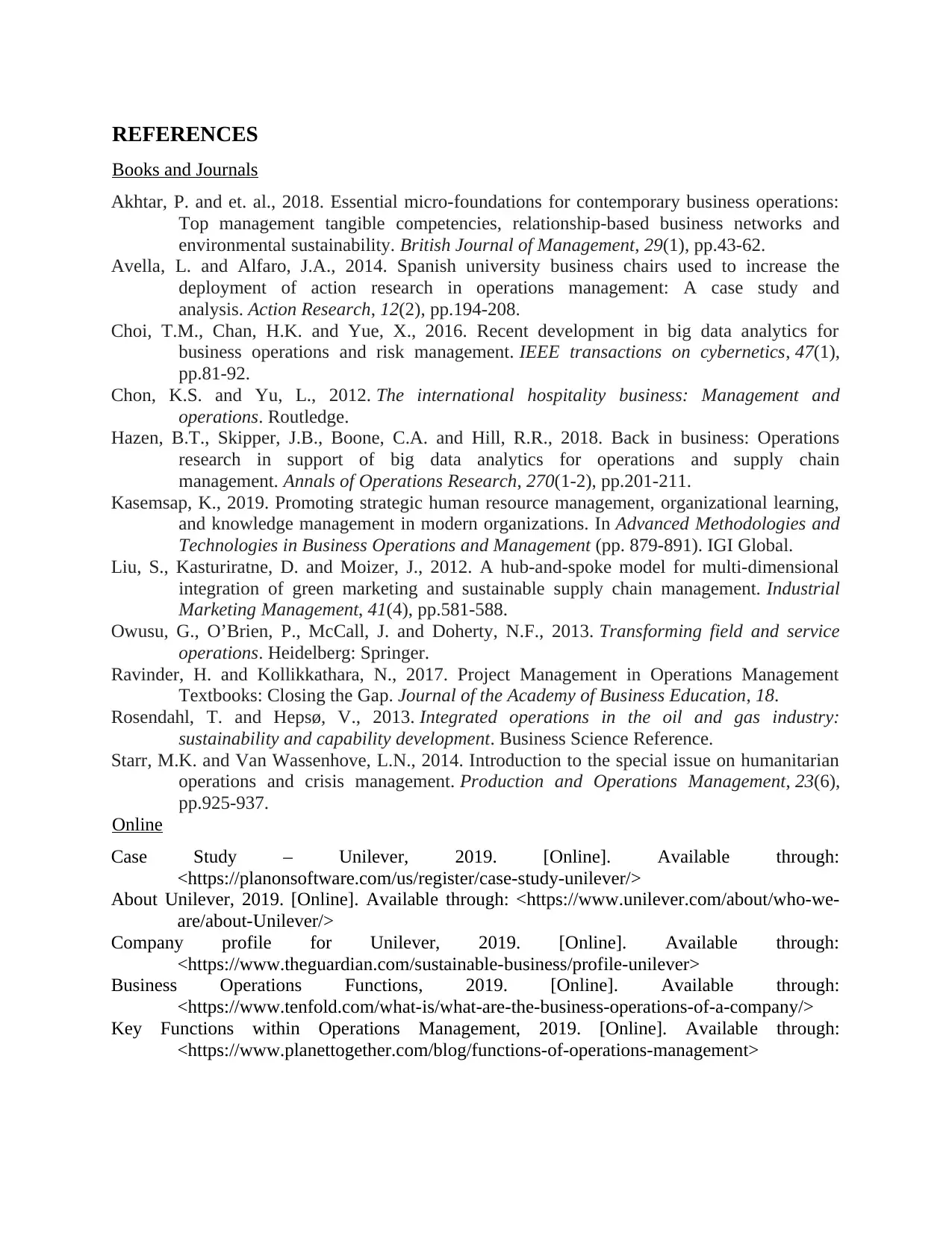
REFERENCES
Books and Journals
Akhtar, P. and et. al., 2018. Essential micro‐foundations for contemporary business operations:
Top management tangible competencies, relationship‐based business networks and
environmental sustainability. British Journal of Management, 29(1), pp.43-62.
Avella, L. and Alfaro, J.A., 2014. Spanish university business chairs used to increase the
deployment of action research in operations management: A case study and
analysis. Action Research, 12(2), pp.194-208.
Choi, T.M., Chan, H.K. and Yue, X., 2016. Recent development in big data analytics for
business operations and risk management. IEEE transactions on cybernetics, 47(1),
pp.81-92.
Chon, K.S. and Yu, L., 2012. The international hospitality business: Management and
operations. Routledge.
Hazen, B.T., Skipper, J.B., Boone, C.A. and Hill, R.R., 2018. Back in business: Operations
research in support of big data analytics for operations and supply chain
management. Annals of Operations Research, 270(1-2), pp.201-211.
Kasemsap, K., 2019. Promoting strategic human resource management, organizational learning,
and knowledge management in modern organizations. In Advanced Methodologies and
Technologies in Business Operations and Management (pp. 879-891). IGI Global.
Liu, S., Kasturiratne, D. and Moizer, J., 2012. A hub-and-spoke model for multi-dimensional
integration of green marketing and sustainable supply chain management. Industrial
Marketing Management, 41(4), pp.581-588.
Owusu, G., O’Brien, P., McCall, J. and Doherty, N.F., 2013. Transforming field and service
operations. Heidelberg: Springer.
Ravinder, H. and Kollikkathara, N., 2017. Project Management in Operations Management
Textbooks: Closing the Gap. Journal of the Academy of Business Education, 18.
Rosendahl, T. and Hepsø, V., 2013. Integrated operations in the oil and gas industry:
sustainability and capability development. Business Science Reference.
Starr, M.K. and Van Wassenhove, L.N., 2014. Introduction to the special issue on humanitarian
operations and crisis management. Production and Operations Management, 23(6),
pp.925-937.
Online
Case Study – Unilever, 2019. [Online]. Available through:
<https://planonsoftware.com/us/register/case-study-unilever/>
About Unilever, 2019. [Online]. Available through: <https://www.unilever.com/about/who-we-
are/about-Unilever/>
Company profile for Unilever, 2019. [Online]. Available through:
<https://www.theguardian.com/sustainable-business/profile-unilever>
Business Operations Functions, 2019. [Online]. Available through:
<https://www.tenfold.com/what-is/what-are-the-business-operations-of-a-company/>
Key Functions within Operations Management, 2019. [Online]. Available through:
<https://www.planettogether.com/blog/functions-of-operations-management>
Books and Journals
Akhtar, P. and et. al., 2018. Essential micro‐foundations for contemporary business operations:
Top management tangible competencies, relationship‐based business networks and
environmental sustainability. British Journal of Management, 29(1), pp.43-62.
Avella, L. and Alfaro, J.A., 2014. Spanish university business chairs used to increase the
deployment of action research in operations management: A case study and
analysis. Action Research, 12(2), pp.194-208.
Choi, T.M., Chan, H.K. and Yue, X., 2016. Recent development in big data analytics for
business operations and risk management. IEEE transactions on cybernetics, 47(1),
pp.81-92.
Chon, K.S. and Yu, L., 2012. The international hospitality business: Management and
operations. Routledge.
Hazen, B.T., Skipper, J.B., Boone, C.A. and Hill, R.R., 2018. Back in business: Operations
research in support of big data analytics for operations and supply chain
management. Annals of Operations Research, 270(1-2), pp.201-211.
Kasemsap, K., 2019. Promoting strategic human resource management, organizational learning,
and knowledge management in modern organizations. In Advanced Methodologies and
Technologies in Business Operations and Management (pp. 879-891). IGI Global.
Liu, S., Kasturiratne, D. and Moizer, J., 2012. A hub-and-spoke model for multi-dimensional
integration of green marketing and sustainable supply chain management. Industrial
Marketing Management, 41(4), pp.581-588.
Owusu, G., O’Brien, P., McCall, J. and Doherty, N.F., 2013. Transforming field and service
operations. Heidelberg: Springer.
Ravinder, H. and Kollikkathara, N., 2017. Project Management in Operations Management
Textbooks: Closing the Gap. Journal of the Academy of Business Education, 18.
Rosendahl, T. and Hepsø, V., 2013. Integrated operations in the oil and gas industry:
sustainability and capability development. Business Science Reference.
Starr, M.K. and Van Wassenhove, L.N., 2014. Introduction to the special issue on humanitarian
operations and crisis management. Production and Operations Management, 23(6),
pp.925-937.
Online
Case Study – Unilever, 2019. [Online]. Available through:
<https://planonsoftware.com/us/register/case-study-unilever/>
About Unilever, 2019. [Online]. Available through: <https://www.unilever.com/about/who-we-
are/about-Unilever/>
Company profile for Unilever, 2019. [Online]. Available through:
<https://www.theguardian.com/sustainable-business/profile-unilever>
Business Operations Functions, 2019. [Online]. Available through:
<https://www.tenfold.com/what-is/what-are-the-business-operations-of-a-company/>
Key Functions within Operations Management, 2019. [Online]. Available through:
<https://www.planettogether.com/blog/functions-of-operations-management>
1 out of 9
Related Documents
Your All-in-One AI-Powered Toolkit for Academic Success.
+13062052269
info@desklib.com
Available 24*7 on WhatsApp / Email
![[object Object]](/_next/static/media/star-bottom.7253800d.svg)
Unlock your academic potential
© 2024 | Zucol Services PVT LTD | All rights reserved.





